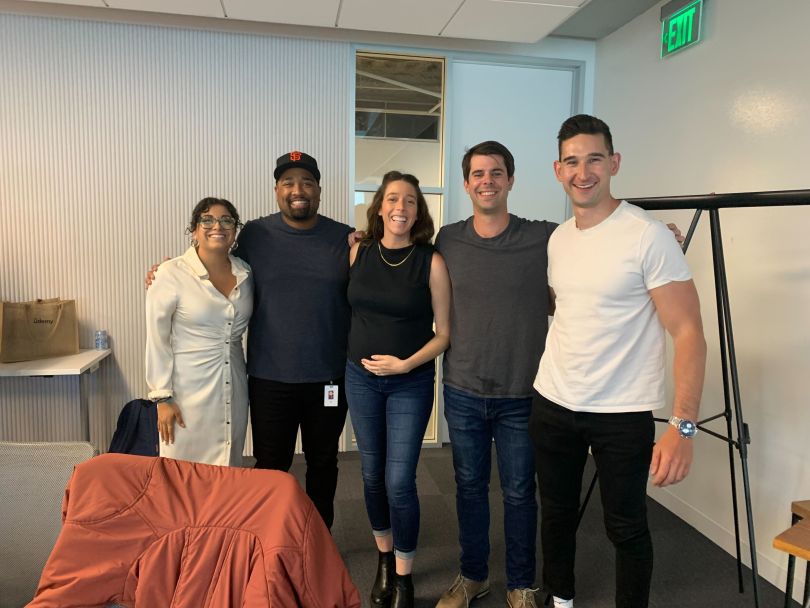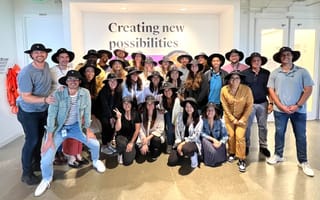“Hey, dude, I’m not trying to be weird, but can I shake your hand?” the stranger asked Philip Louis De Coy II.
The unknown figure held out his palm in expectation.
It was 2019. The two were standing in the parking lot of Beep’s Burgers, a drive-in burger joint off Ocean Avenue in San Francisco. De Coy wore his Udemy Business North Face jacket against the chill of the Bay Area breeze as he waited in line for one of Beep’s charred, half-pound patties.
In the glow of the green and red neon sign, De Coy eyed the stranger warily. San Francisco has a lot of strange characters.
“What’s up?” he asked, confused.
The stranger smiled and gestured to De Coy’s North Face. “I saw your jacket and I wanted to shake your hand. My sister is a single mom and she started taking coding courses on the Udemy site. She just got a job as a coding developer, and Udemy changed her life.”
In re-telling that story today, De Coy remarked, “At that moment, I was so humbled. I shook his hand and told him I was on the customer success team. I will never forget that conversation; I knew then that Udemy had that special sauce.”

De Coy is an emerging customer success manager for Udemy Business, a division of the company that works with HR business partners to offer this kind of life-changing learning and skill development opportunities at all levels of the organization. His experience with the stranger is one that many of his colleagues, including Denver-based Han Hong, the senior director of customer success. Hong is also frequently approached at coffee shops, airports and at industry events with similar stories every time she wears her Udemy swag.
Those familiar with Udemy most likely know the EdTech unicorn for its direct-to-consumer (DTC) personal development, which includes skill growth in topics ranging across a variety of topics, including cooking coding, writing, real estate to marketing courses. With Udemy Business, learning goes beyond the individual to empower global teams and organizations to remain competitive in continuously evolving markets at the pace of change.
Udemy Business took off during the pandemic. Amidst the backlash to the Great Resignation, employers realized they needed to engage their employees and business leaders to help empower, strengthen and close mission-critical skill gaps from technical certifications, such as Amazon Web Services certifications, to Change Management and Leading Through Turbulence. “Udemy Business is phenomenal to be a part of. We have an interesting solution portfolio that is agile and adaptable to help organizations drive strategic business outcomes,” said Director of Corporate Sales Annette Kasper.
Udemy is growing significantly to support this business segment and its enterprise clients. The company is expanding outside the Americas to Europe, Africa, the Middle East and Asia Pacific. Departments such as the customer success team are specializing to meet the demands of different customer segments. All of this scaling translates to career opportunities and autonomy for ambitious, growth-minded professionals.
Udemy Growth by the Numbers
- Over 57 million learners and over 773 million course enrollments are on the platform.
- 74,000 instructors are teaching over 213K courses in over 75 languages.
- Over 13,400 enterprise customers and more than half of the Fortune 100 are Udemy Business customers.
- Udemy Business customers have access to 19,000 courses, 8,300 of which are in English.
In light of the success of Udemy Business, Built In sat down with De Coy, Kasper and Hong to get more insights into the excitement and growing pains that come with success at this scale. Here’s what they had to say.
Give us some background on Udemy Business and its associated services. What is it? How has it evolved?
Emerging Customer Success Manager Phil De Coy: Udemy Business provides our customers access to over 19,000 curated, top-rated content across a variety of business and technology topics. These courses are accessed through the Udemy Business platform, where clients can use features like learning paths and analytics to help drive strategic learning and development initiatives for their organizations.
With Udemy Business Pro, learning paths combine on-demand courses with hands-on, immersive experiences such as labs, assessments and sandboxes to gain real-world practice to sharpen IT, data and development skills. These exercises enable learners to quickly identify their skill strengths and areas of opportunity to improve, with access to course recommendations to deepen their knowledge base.
Cohort Leadership Development Offering
Senior Director of Customer Success Han Hong: Before I joined the company, I had a friend who messaged me about Udemy Business. I was working at another learning company and was surprised to hear that Udemy Business was just a startup. I was like, ‘What do you mean you’re just building this out? I’m already seeing it across my entire customer base.’
We’ve evolved significantly and want to be the learning company for businesses. We’ve expanded our services; for example, we’re now offering an immersive learning experience for people who want to build out a technical skill set. It gives them a guided experience to practice and apply what they are learning.
Director of Corporate Sales Annette Kasper: There are a lot of different feedback loops in our products. Users who take courses can give direct feedback to the instructors, and we moderate that. A few years ago, the most common feedback was asking for more complex topics, especially for a tech audience. We have users who want to go from a level-two engineer to a level-three. We passed that feedback to our instructor population, who responded by creating relevant courses
How did the Covid-19 pandemic impact the growth of Udemy Business?
Kasper: Before the pandemic, companies viewed learning as a perk that was ‘nice to have.’ After the pandemic, there was a huge increase in buzz about e-learning. Companies realized this was the solution to keeping employees engaged. In sales, people we were never able to get on calls started knocking on our doors, and the level of conversations we were having were much more in-depth than before.
“People we were never able to get on calls with started knocking on our doors.”
De Coy: Udemy was in a unique position during the pandemic. The company has always focused on democratizing learning. With the success of the Udemy marketplace, Udemy Business had a chance to thrive as businesses closed and remote work became more common. During this pandemic, people looked for easier and more scalable ways to learn. Udemy was the perfect industry disruptor to the traditional ways people have been accustomed to learning.
How did the popularity of this product lead to growth at Udemy?
Kasper: We’re quickly growing our teams across sales and customer success — everything that touches the B2B side. Covid-19 accelerated digital transformation strategies, and learning and upskilling are part of that. We’re putting a lot of investment into that side of the business. When I started three and a half years ago, we had maybe 2,000 courses on our B2B side. Now we have 13,400 enterprise customers and 213,000 courses in 75 languages and 57 million learners. The numbers have grown astronomically.
Hong: As our sales teams have grown to meet the increased demand for learning, so has our global customer success organization. We have lots of people spanning scaled and high-touch customer success, professional services and renewals across the Americas, EMEA and APAC. The commercial customer success organization supports organizations with 5 to 5,000 employees in the Americas. It’s been exciting to see and be a part of our growth journey.

Has that growth leveled off?
Kasper: The Udemy Business side has been a hockey stick. Companies need to keep employees engaged, and during the global pandemic, they needed to accelerate how employees did that work. They do that through learning and training. During the Great Resignation, companies wondered how to retain people and show they were valued. Now, as we enter a potential recession, companies are wondering how to keep a core group of employees at their organization and keep the business afloat. That’s what CEOs are thinking about. They do that with advanced learning and training, which can be done through Udemy Business.
Hong: With the uncertainty in the economy and organizations having layoffs, managers are wondering how to continue being productive. That impacts morale and expands the scope of responsibility for employees. They need new skills. So a lot of the things we learned from Covid-19 are similar to what we’re experiencing now.
Have there been any growing pains?
Hong: Naturally, as an organization matures, it gets bigger and the volume of customers increases. What has to catch up is the infrastructure, systems and support. Like any other organization, we’ve seen that as we scaled. There’s always a question of whether it will change the culture. Instead, it evolves. Our chief learning officer, Melissa Daimler, just released a book about this, titled Reculturing. It’s been an awesome foundation for us to rethink our values and identify the best practices of reculturing as we evolve.

Kasper: When a company goes public, you have to scale quickly and change how you operate. At the end of the day, what hasn’t changed are the people. We hire great people, and that’s a big reason people love working here. We have a lot of transparent conversations about what hasn’t worked, and we’re able to iterate.
“We hire people who have a growth mindset, are able to change, are able to explain why they made changes and take accountability.”
How has Udemy’s growth impacted your career?
De Coy: Udemy began to gain major steam toward an IPO during the pandemic, which helped me grow my career as customer deals began to get more complex. I became more interested in a high-touch approach — a customer success manager position. Through Udemy’s success, I was able to join a growing commercial team as an emerging customer success manager and bring my experience with me!
Hong: During Covid-19, we saw a blurring of the lines between our professional and personal lives, and at Udemy, we have a value to be earnestly authentic. People bring their whole selves to work, but there was a new level to that as we entered the pandemic. I remember watching some courses on how to be a more empathetic leader because all of my employees were going through a hard time. I needed to support them in a different way, and it stretched me as a leader, but I was able to take courses that helped.
Is there anything you are particularly proud of accomplishing during your time with Udemy?
De Coy: I am proud of being a founding member of the Black Employee Network employee resource group (ERG), where I was able to attend AfroTech in 2019 and host an ERG virtual black artist art show in 2020 for Udemy employees.
Hong: In our most recent employee engagement survey, my team attained 91% satisfaction. This is high for any team. The customer success role is challenging and demanding, and this speaks to the engaging, positive and connected culture we've created for our team. Udemy empowers us to lead, which is people-first, and it shows.
Kasper: The list of all the ways I’m proud of my team is endless. But personally, I’m really proud that several of my reps and I made it to President's Club back to back.
Udemy’s President’s Club is an annual trip for people who hit 100 percent or more of their quota. We combined both 2020 and 2021 club trips because of Covid-19 and were able to celebrate this past April in Costa Rica. After not seeing some people from our different teams in a couple of years, this club trip was extra special. We were able to recognize the hard work across the sales teams and the people who support sales and achievers and their plus one got to spend their time in Costa Rica with monkeys swinging in the trees above the pools!
What should candidates expect if they join your team?
Hong: The most important people in your Udemy journey are going to be your teammates. They will be your cheerleaders, supporters, collaborators and challengers. It’s a love fest between all of them; they have a #squad channel on Slack with no managers, and it blows up every day. They are so supportive of each other. That’s really important for the dynamic of any organization.
De Coy: People should join Udemy, specifically customer success, because we are trailblazers that work hard and support each other. I have never been on a team this amazing in my career. Udemy customer success (CS) is truly blessed to have an awesome group: a supporting cast of colleagues, executive leadership and managers.
“We have a really unique sales culture. It’s not cutthroat. No one is just a number.”
Kasper: We have a really unique sales culture. It’s not cutthroat. We value emotional intelligence, empathy and people for who they are, but without sacrificing our performance. The sales team isn’t this uniform 'everyone looks the same, acts the same, does the same,’ but we really value people from all walks of life and bring new perspectives. Because of that, you’re going to have a phenomenal team.








